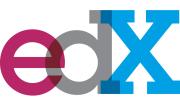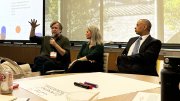edX, the nonprofit Harvard-MIT online learning partnership, today announced a partnership with Google to jointly develop edX's open-source software. The edX-Google partnership will, according to the news announcement, build and operate MOOC.org (the acronym for massive open online courses), through which institutions that are not members of the edX consortium—other universities and colleges, businesses, government, and nonprofit entities—and individuals (teachers and others) will be able to create and host courses for audiences around the globe. The MOOC.org partnership carries the potential for rapid expansion of edX's platform, even as for-profit online enterprises seek to enlarge their markets. It may also affect edX's potential to develop streams of revenue to support its operations.
Details of the partnership have not yet been disclosed. edX has planned all along to make its software an open-source product, in contrast to the announced practices of for-profit MOOC enterprises, including Coursera and Udacity. edX member institutions, which in some cases have made multimillion-dollar investments in course development, will not want the fee arrangements now in place for their courses to be undercut (read an account of the $50,000 to $250,000 per-course fees as reported by the Chronicle of Higher Education). On the other hand, a widely adopted open-source platform would:
- encourage innovation and development, to the benefit of the formal edX partners and their faculty members and students;
- presumably create some sort of fee revenues from new MOOC.org users, of benefit to edX and its full members; and
- hold out the potential advantages of establishing a recognized market standard.
For Google, the issues are a bit more complex. It will apparently maintain, but not develop further, its Course Builder platform for online education (which appears not to have attracted as wide a following as the edX and Coursera offerings). It was piloted for a Google course on searching in the summer of 2012, and then developed a few months later as a platform assembled from Google components (YouTube, App Engine, Groups, Apps, Google+, etc.). Google also has close ties to Sebastian Thrun, the computer scientist who gave up his Stanford professorship to pursue the Udacity MOOC company and platform, and to continue his affiliation as a Google Fellow (where he helped pioneer the self-driving automobile and Google Glass).
For its part, edX has reportedly been hosting its MOOC offerings via Amazon's computer cloud services. Google, with vast server farms of its own, would seem to be in line to compete for or assume that function, since the news release is explicit about operating the new MOOC.org with edX. A Google blog post mentions its "breadth of applicable infrastructure," seemingly underscoring that potential to service a group of millions of users, consuming video, audio, and textual content online, distributed around the world.
Not all academic affiliations with Google have proceeded smoothly. The Google Books project, begun in the middle of the previous decade, aimed to digitize research universities' libraries (and other collections), to disseminate the content worldwide. But it ran afoul of copyright problems, authors' rights and financial interests, concerns about fees for access to scanned content, and other issues, and so has stopped short of its ambition to be a universal digital library. (A public model for such a project, the Digital Public Library of America, is being developed.)
It will be interesting to see whether MOOC.org will be developed as an advertising medium—the key revenue source for Google's core search service—or provide users the opportunity to accept or host advertising on their courses built on the open-source edX software platform. The new announcement is silent on this possibility, and on other fee or revenue options.
Most of edX's outreach to potential students is effected via its website and social media; Google provides an enormous resource to enhance this channel of communications.
Finally, an even larger point of leverage (also unaddressed in the announcement) may be particularly tantalizing to edX participants and MOOC advocates who see online-learning technologies as especially important for disseminating education to underserved parts of the world—for instance, in Africa and Southeast Asia. As reported in the recent Scientific American special report on "Learning in the Digital Age" and elsewhere (read a summary in "The Turn in Online Education"), many students in such settings do not have Internet access and cannot be expected to pursue courses delivered to computers. Mobile technologies—particularly the advent of lower-cost smart phones—may be essential if they are to access MOOC courses readily. Google, with its market-leading Android mobile system and its Motorola phone-manufacturing subsidiary, may be in an excellent position through the edX partnership to quickly develop and optimize delivery of content-rich MOOC courses to such learners through that technology. Doing so requires skills that have tested other technology enterprises during the paradigm-changing shift to mobile computing and communications
Until edX and Google say more about their plans, this is speculation. For now, in the official news announcement, Anant Agarwal, the MIT electrical-engineering professor who is edX president—and a particularly forceful proponent of "planet-scale democratization of education"—said of the new Google affiliation, "[We] believe they will be a perfect partner to work with as we shape the next generation of open education and learning." He went on to note that "Google shares our mission to improve learning both on-campus and online. Working with Google's world-class engineers and technology will enable us to advance online, on-campus, and blended learning experiences faster and more effectively than ever before."









